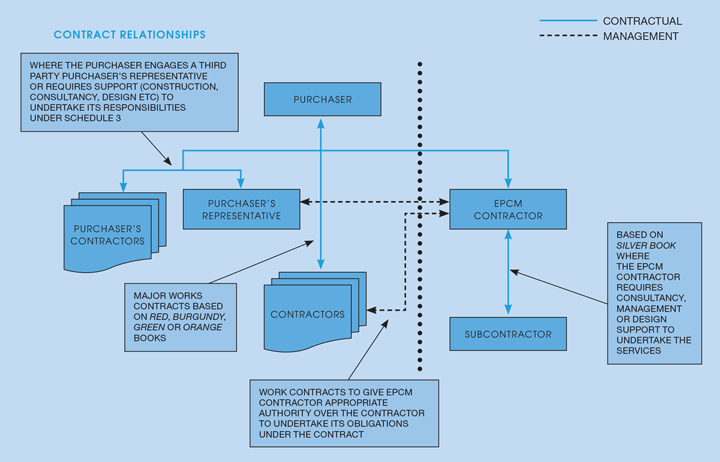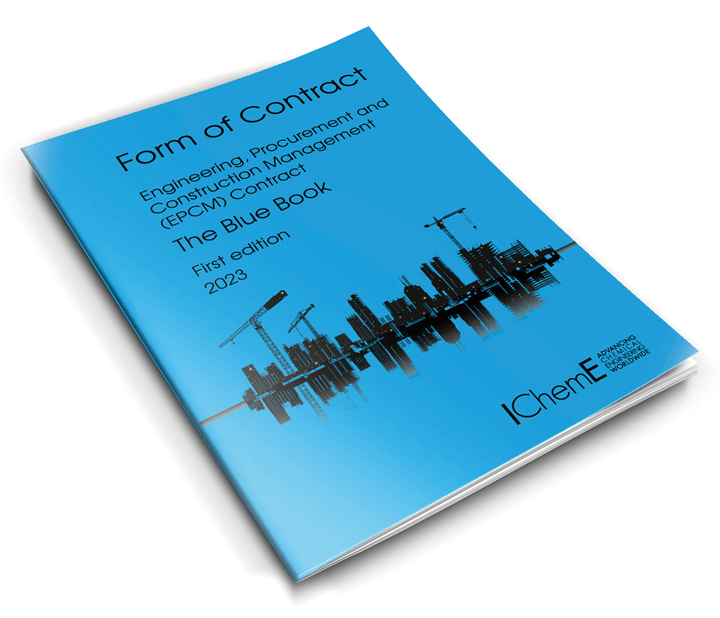New Form of Contract for EPCM Services: Blue Book

John Challenger explains why IChemE has launched this completely new and unique form of contract
ICHEME recently launched its latest form of contract, known as the Blue Book, for the provision of engineering, procurement and construction management (EPCM) services. Under this form of contract, it is emphasised that the EPCM contractor is not expected to undertake any construction or installation works as these elements are all to be handled by contractors appointed under individual works contracts arranged between each contractor and the purchaser. It is envisaged that the role of the EPCM contractor is to manage the overall project, and if required, to undertake the design of the plant and to act on behalf of the purchaser as the project manager within each works contract.
IChemE had become aware of an increasing demand for contractual arrangements that allow purchasers to appoint contractors with the necessary capability to manage and deliver major projects but without the financial and general liabilities associated with lump sum or target cost contracts in which the entire project cash flow would pass through the contractor’s accounts. In addition, the purchaser may decide that it is advantageous to maintain long term direct relationships with specific suppliers for either commercial, technical or confidentiality reasons. In the UK there has been a notable reduction in the number of contractors willing to take responsibility for total design and construction projects for a variety of reasons which are not the subject of this article; it is this worrying situation that encouraged IChemE to develop the Blue Book in its current published form.
Some EPCM projects have already been commenced using a modified version of the IChemE Professional Services Contract (the Silver Book). The coordination and management roles and responsibilities of the EPCM contractor under the Blue Book are more extensive than those required by a professional services contract, as these are often silent on issues that relate to the multiple contractual relationships that exist within any EPCM format.
The chart below provided guidance to the drafting team concerning the primary commercial and contractual relationships in the EPCM contract that are to be adopted during the project execution.

For those familiar with other published IChemE contracts, the structure of the Blue Book is similar both in its content and arrangement as it contains a typical form of agreement and general conditions of contract between the purchaser and the EPCM contractor and a requirement to accurately draft the associated specification and schedules. The pricing provisions allow reimbursable, fixed or target price arrangements to be used.
Guide notes are included to aid interpretation of the general conditions and they are particularly helpful when preparing the specification, schedules and any special or optional conditions that may need to be written to meet specific contract/project requirements. It is emphasised that the Blue Book does not incorporate a draft works contract as it is envisaged that the one or more of the existing IChemE forms of contract may be used as a basis since they will readily integrate with the EPCM contract and can be easily adapted to suit most works contract requirements. Some purchasers may wish to use in-house forms of contract and whilst these may be preferred, it is important that these are suitably modified to operate within the Blue Book structure.
The importance of specialist companies that will act as contractors for the works is critical to the success of an EPCM contract since the outcome will be dependent on their specialist knowledge experience of the systems, equipment, and materials that they provide. It should also be noted that the EPCM contractor is appointed to provide a professional service and expertise to assist the purchaser in achieving a successful project and this philosophy is particularly important when acting as project manager in each of the works contracts. It is in the best interests of the parties to cooperate with each other, since the EPCM contractor must fairly represent the purchaser’s interests when managing the works contracts and the project as a whole.
The optional conditions
The Blue Book is structured to be used internationally and examples are provided of optional conditions to deal with project specific requirements. The optional conditions have been divided into three sections, the first relating to projects that are to be undertaken in the UK (part A), the second provides for the execution of the contract under a target price arrangement (part B) and the third (part C) covers requirements either due to the specific content of the project or to the specific laws or regulations in the location where the contract is to be executed plus alternative means of dispute resolution.
Pre-contract issues
Comparison of tenders for EPCM contracts can present different challenges to engineering, procurement and construction (EPC) contracts. It is important that the purchaser establishes suitable criteria that will enable reliable comparisons to be made between competing companies. Because of the difficulty of comparing the different levels of service provision and rates proposed by the various tenderers, the final decision may inevitably depend on the purchaser’s assessment of the technical and management capability of potential EPCM contractors. An important factor to be considered is the close working relationship and cooperation between the parties in managing and coordination the works contracts. It is therefore important to ensure that the tenderers provide references and records of the recent past performance in the relevant field of technology and on similar projects so that a full assessment of competence can be determined.
Some key elements of the contract
The contract recognises that purchasers may wish to commence a project at a stage when the project technical definition or execution methodology have not been fully defined. This may mean that aspect of the specification, the schedules and the commercial strategy cannot be fully drafted prior to contract signature. The contract facilitates the controlled transition between the design, scope of services, initial budget or programme of works to an approved and mutually agreed status. Clearly at the start of any EPCM contract the cost of the works may be based on estimates established prior to the placement of works contracts. Much can change between the initial signing of an EPCM contract and the completion of the design and procurement phases of the project. The Blue Book seeks to provide practical and controlled procedures to support the development of the technical, commercial and time parameters. It is because of the open situation at the start of an EPCM project that a reimbursable pricing arrangement is likely to be the preferred option. The contract provides controls to enable the appropriate monitoring and reporting to be managed by the EPCM contractor, typically by the use of target price arrangements, approval milestones or caps on expenditure in order to avoid uncontrolled escalation of costs and project durations.
The Blue Book, like other IChemE contracts, requires a well defined specification for the plant plus a series of schedules that provide the methodology of how the project is to be executed and it is essential that users recognise that these are an important and integral part of the contract. The manner in which the contract is executed, and the commercial content will be dependent on the extent to which the specification and schedules have been drafted. Where possible, the concept and basic definition of the plant should be developed in as much detail as possible to establish a robust starting point for the EPCM contract.
IChemE has retained its well-established testing procedures for the completion of construction, take over and process performance and the role to be played by the various parties in their execution. Take over is a key stage in the project and it is very important from both contractual and safety points of view that responsibility for the plant should pass from the EPCM contractor to the purchaser in a clearly defined and unambiguous manner. The time for this to be done would normally be before any raw materials are fed into the Plant. Under some circumstances, the EPCM contractor may take responsibility for the initial operation of the plant during a take over test period but from the time that take over occurs, the purchaser is responsible for the care, operation, maintenance, and safety of the plant. It should also be noted that the defects liability period starts on the date of taking over. Due to the inter-relationship between sections or systems of a process plant and the sequence of construction completion followed by take over, careful management by the EPCM contractor in conjunction with the purchaser will be required. If several sections need to be tested to an agreed standard prior to a take over certificate the roles and responsibilities of each works contractor will need to be thoroughly planned and coordinated by the EPCM contractor. Once a section of plant has been taken over and is subsequently under the control of the purchaser, the EPCM contractor’s role will change to one of attendance.
Because the EPCM contractor’s role in the EPCM contract is one of a service provider, the fitness for purpose obligation that exists in the IChemE Red, Green and Burgundy contracts, does not exist in the Blue Book. The General Conditions state that the EPCM contractor is responsible for arranging the necessary services to make good any defects found in the works contracts, to the cost of the purchaser, except where the defect is due to the failure of the EPCM contractor to exercise due skill and care. The defects liability period remains in common with the other IChemE forms and generally expires 12 months after the taking over of the plant. Careful consideration of the liability periods for each works contract need to be taken into account particularly if the overall plant is to be completed in sections. In general, the Blue Book adopts the same sequential and structured approach regarding the necessary off-site testing, completion of construction, take over and performance testing that is a feature of the other IChemE contracts, except the role of the EPCM contract is limited to management of the works contract and thorough coordination of the complete project.

Advantages of EPCM
In many respects, EPCM contracts are one of the most complex of forms to set up and execute because of the additional layers of communication and management that are required between the EPCM contract, the works contracts and the purchaser. Despite this, if managed well this method of executing projects can be very successful and can provide significant benefits to the parties, particularly in the modern contracting environment.
The Blue Book is the first of its kind to be published and has attempted to provide a flexible platform that will help the process industries overcome the limited contractor capacity particularly where companies are unwilling willing to take full EPC contract risk.
Are you interested in becoming an IChemE volunteer? Volunteers help strengthen our community and it’s good for your CPD. To browse the latest volunteering opportunities, visit: https://www.icheme.org/about-us/people/volunteer-for-icheme/volunteering-opportunities/
Recent Editions
Catch up on the latest news, views and jobs from The Chemical Engineer. Below are the four latest issues. View a wider selection of the archive from within the Magazine section of this site.




